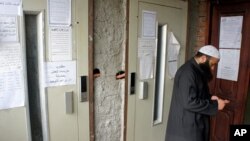As Egypt prepares for its first elections since a popular uprising, many new actors have entered the political scene. Among them are Salafi Muslims, whose fundamentalism is seemingly at odds with both hopes for a democratic future and the country's long history of tolerance and pluralism.
The mosque of Sheikh Shaaban Darwish sits side-by-side a Coptic church, not an unusual sight in Egypt where roughly ten percent of the people are Christian. But the Taawoun area of Giza is unmistakably Muslim, and conservative Muslim at that. The bearded men wear prayer caps, and the form-fitting clothes of women in wealthier neighborhoods give way to the flowing head-to-toe black of the niqab.
The Salafi sheikh, whose Saudi headdress is a nod to prominent backers of puritan Islam, points to the proximity of the church as a sign of tolerance. He also welcomes the coming of democracy, just not the hypocritical, anti-Muslim kind he says is espoused by the West.
Darwish says democracy has some of the advantages of Islam, but he argues Islam is "the authentic commodity", and democracy an "alternative." Islam, he says, allows for a democracy that convinces Muslims and others "that Islam is the end and not the means."
Such beliefs are not surprising among a group that follows the ideas of the first three generations of Muslims some 1400 years ago. But as Salafis raise their political profile, they are also raising alarm among democracy advocates who sought to bring Muslims, Christians and secularists together on Tahrir Square.
Activists look to recent incidents that seem to undermine their efforts at pluralism. In Fayoum, south of Cairo, one person died in a clash between Salafi Muslims and the Christian owner of a liquor store. In Qena, Salafists attacked a Coptic man they accused of renting an apartment to a prostitute. They cut off his ear.
Darwish dismisses such incidents as the work of individuals and blames the media for making too much of them.
Besides, he says, Salafi ideology doesn't count cutting off an ear among its punishments.
In addition to fears of people coming under attack, some worry even Egypt's heritage would be in danger should Salafists have their way.
Darwish says he distinguishes between monuments and idols, and that the pyramids, for example, are safe.
He says Salafists wouldn't even physically destroy idols, as the Taliban did in Afghanistan. Rather, he says, they will "destroy them in people's minds, their culture and their hearts" through "right preaching."
The former government often justified the heavy hand of its security by pointing to the threat of extremists stoking sectarian divides. Such fears were not lessened when the overwhelming approval of last month's referendum was tied in part to the slogan "Islam is the answer."
Moreover, while much attention has been paid to upcoming presidential elections and the largely secular potential candidates, it is the parliamentary vote that will likely have a more deciding effect on the country's future. The next parliament will decide on a new constitution, and with it how secular or religious the new Egypt will be.
Just how well Salafists might do is unclear. There are few reliable opinion polls, so it is hard to know how wide their appeal is after decades of repression. The more moderate Muslim Brotherhood, despite also being harassed, has a well-established social and political network and some believe the two could join forces to give Islamists a prominent position in the next parliament.
But Mohamad Salah, the head of the London based el-Hayat newspaper and an observer of Islamic movements, thinks that unlikely.
Salah says it would be difficult for the Brotherhood to associate itself with any movement seen as extremist. He argues it has spent a long time denouncing radicalism and opening up its base to present a more voter-friendly movement.
He also does not believe Salafism is very widespread, although he points to changes in recent years that may have attracted some Egyptians.
He says the increase of satellite channels - in particular Saudi religious ones - as well as the spread of poverty and what he calls ignorance have all boosted the fundamentalists' ranks.
But those channels have brought something else - a greater window on the world.
That awareness is on display upstairs from the Sheikh's office.
Step out of the elevator - there are separate ones for men and women, with a recording of a travelers' prayer playing as the car ascends - and one enters a ceremony for women of the mosque. The celebrants have successfully memorized the Quran.
There is singing and laughing and for entertainment, a dead-on parody of Moammar Gadhafi and his recent, rambling "zenga zenga" speech.
These women are separate, but they are informed.
It's that kind of information - what is happening both at home and abroad - that helped spread the pro-democracy movement across the region and, in Egypt, for now, helped put an end to repression.




